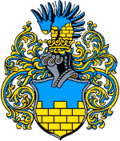Bautzen
Bautzen ([ˈbautsn̩] , Upper Sorbian: [Budyšin] Error: {{Lang}}: text has italic markup (help), Lower Sorbian: [Budyšyn] Error: {{Lang}}: text has italic markup (help) [ˈbudɨʃɨn]; Polish: [Budziszyn] Error: {{Lang}}: text has italic markup (help)) is a city in eastern Saxony, Germany, and capital of the Bautzen Rural District.[1] It is on the Spree River.
|
Bautzen/Budyšin | |
|---|---|
 | |
| Coordinates: 51°10′53″N 14°25′27″E / 51.18139°N 14.42417°ECoordinates: 51°10′53″N 14°25′27″E / 51.18139°N 14.42417°E | |
| Country | Germany |
| State | Saxony |
| District | Bautzen |
| Subdivisions | 15 |
| Government | |
| • Mayor | Alexander Ahrens (none) |
| Area | |
| • Total | 66.62 km2 (25.72 sq mi) |
| Elevation | 204 m (669 ft) |
| Population (2012-12-31) | |
| • Total | 39,743 |
| • Density | 596.56/km2 (1,545.09/sq mi) |
| Time zone | UTC+01:00 (CET) |
| • Summer (DST) | UTC+02:00 (CEST) |
| Postal codes | 02625 |
| Vehicle registration | BZ, BIW, HY, KM |
| Website | www.bautzen.de |
In 2005, 42,189 people lived in Bautzen. Asteroid 11580 Bautzen is named in honour of the city.
Bautzen is historical capital of Upper Lusatia, and it is the most important cultural centre of the Sorbs, a Slavic minority.
During World War II and the Nazi era, there was a subcamp of the Groß-Rosen concentration camp in Bautzen. Ernst Thälmann was imprisoned there before being deported to Buchenwald.
After the war Bautzen was well known in the German Democratic Republic because of its prison. Bautzen I was used as an official prison, Bautzen II was a secret prison for prisoners of conscience (people arrested for their political beliefs, not because of an ordinary crime). Bautzen I is still used as a prison, and Bautzen II has been a memorial since 1993.
In 2002 the city commemorated its thousandth birthday.
Twin cities
- Worms, since 1990
- Heidelberg, since 1991
- Dreux, France, since 1992
- Jablonec nad Nisou, Czech Republic, since 1993
- Jelenia Góra, Poland, since 1993
Bautzen Media
References
- ↑ KRELL, Detlef. Oberlausitz, Lausitzer Seenland. 3. vyd. Bielefeld: Reise Know-How Verlag Peter Rump GmbH, 2017. 396 s. ISBN 978-3-8317-2920-3. Kapitola Bautzen – Hauptstadt der Oberlausitz, s. 39. (německy)
Other websites
![]() Media related to Bautzen at Wikimedia Commons
Media related to Bautzen at Wikimedia Commons
- Official website Archived 2009-01-03 at the Wayback Machine
- Interactive sightseeing tour through Bautzen Archived 2009-01-01 at the Wayback Machine
- City and regional portal of Bautzen and the Oberlausitz Archived 2006-03-18 at the Wayback Machine









